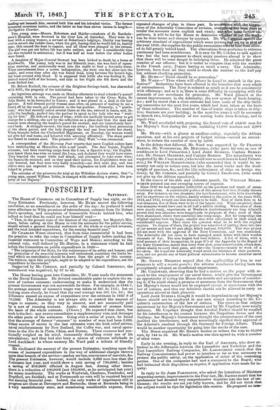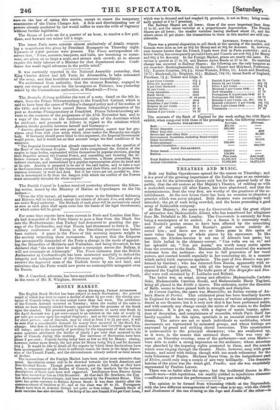POSTSCRIPT.
SATURDAY.
The House of Commons sat in Committee of Supply last night, on the Navy Estimates. Previously, however, Mr. HUME moved the following resolution, as an amendment on the order of the day: he prefaced it with some allusions to Whig promises of retrenchment, extracts from Sir Robert Peel's speeches, and complaints of honourable friends behind him, who talked so loud that he could not hear himself read-
" That, in the present state of the finances of the country, her Majesty's Min- isters, before calling on this House to vote the estimates for the public service, should submit a general financial statement of the whole or expected revenues, and the total intended expenditure, for the ensuing financial year.' Sir CHARLES WOOD observed, that from time immemorial it had been the practice to take the votes in Committee of Supply before making the financial statement in Committee of Ways and Means; according to the rational rule, well defined by Mr. Harries, in a statement which he laid before the Committee on public expenditure in 1828—
" The exigencies of the State, for the maintenance of its safety and honour, and the proinotion of its essential interests well understood, constitute the limits be- yond-which no contribution should be drawn from the people of this country. The revenue, upon this principle, ought to be adapted to the expenditure, not the expenditure to the revenue."
Supported by Mr. COBDEN, and partially by Colonel SIBTHORP, the amendment was negatived, by 97 to 48.
The House having gone into Committee, Mr. WARD made the statement on the Naval Estimates. He devoted considerable pains to explain the na- ture of various excesses; endeavouring to make it understood that the present Government was not answerable for them. For example, in 1846-7, the average amount of seamen's wages was taken at 361. 38. 1 ld.; but on looking more closely, he found that the real average was 38/. I5s. 3d.; the difference caused an excess of expenditure over the estimate in 1847-8 of 70,5241. The Admiralty is not always able to control the amount of wages to seamen; as they vary in amount, and are necessarily paid by a sort of running account. Again: the number of seamen forms the basis of the whole estimate. (Cheers.) He expected that cheer, but such is the fact: any excess necessitates a supplementary vote, and deranges the other parts of the estimates. Going over a series of years, he found that the average of former "excesses" in number of men had been 3,969. Other causes of excess in the last estimates were the Irish relief service, naval reinforcements for New Zealand, the Caffre war, and naval opera- tions in the Rio de la Plata, Chins, and Borneo. These excesses had con- tinually weighed on his mind, incessantly disturbing every one of his calculations- and they had also been a source of extreme solicitude to Lord Auckland: to whose memory Mr. Ward paid a tribute of friendly respect..
He vindicated the amount of the present Estimates; touching upon the causes of increased expenditure in the way of additional charges thrown aeon that branch of the service—packet service, conveyance of convicts, &c. The present Estimates, however, would include 3,000 men leas than the Estimates last year, and would show a nett saving of 730,0001.; besides a saving of 208,0001. effected in August last. Among other items, there is a reduction of 100,0001. (not 180,0001., as he anticipated last year) for steam machinery. The works at Woolwich, Chatham, Pembroke, and Deptford, are finished; and at Portsmouth no vote will be required beyond the ensuing financial year. Indeed, the only works of importance still in prowess are those at Devonport and Bermuda; those at Bermuda being in a very unsatisfactory state, and occasioning considerable expense, from repeated changes of plan in times past. In tions of the Admiralty Committee of revision, eve
perience, it will be for the House to determine i:i-Ztilano'tfire-Tuti
render the accounts more explicit and exact;
can be done better and cheaper by contract. Mr. a argued against arbitrary standard of expenditure which some personallad set 3Amor the year 1835 : the supplies for the public necesssities Ar' e at +ha
ed to fall greatly behind hand. The alternations from profusion to extreme parsimony had been mischievous. It is easy for Mr. Cobden to talk against war; but the best argument to check angry passions abroad is to show that there will be some danger in indulging them. He admitted the great number of our officers: but it is unfair to compare that with the number in the French navy, France having so small a navy. The Admiralty, however, have done all they could to check the number on the half-pay list, without checking promotion.
Mr. IEEE—" There should be no promotion?'
Mr. WARD—" Then where will officers be found to embark in the pro- fession?" Reductions have been effected in the branches that most admit of retrenchment. The Navy is reduced as much as it can be consistently with efficiency; and as it is, there is some difficulty in complying with the demands of our merchants for protection. Mr. Ward glanced at the recent improvements in the Admiralty, the new system of book-keeping, &c.; and lie stated that a close estimate had been made of the ship-build- ing necessities for the next five years, which had been taken as the basis of those reductions. The number of line-of- battle ships is taken at fifty- five; fourteen are now building; in the next five years it will be necessary to launch two, independently of one coming home from Bombay, and to repair two.
Mr. Ward concluded with proposing the formal vote of 40,000 men for her Majesty's fleet during the year, including 14,000 marines and 2,000 boys.
Mr. HUME—with a glance at needless outlay, especially the African squadron, and at his own projects of budget retbrm—moved an amend- ment, to reduce the number of men by 5,000.
In the debate that followed, Mr. Ward was supported by Sir FRANCIS BARING, Mr. WODEHOUSE, Mr. MITCHELL, (who gave his vote as one of confidence in Lord Palmerston.) Lord JonN RUSSELL Captain BERKE- LEY, Mr. SIDNEY HERBERT, and Captain Huss. The amendment was supported by Mr. URQUHART, (who would vote no confidence in Lord Palmer- ston,) Sir WILLIAM MOLESIVORTH, (who contended that it would be ne- cessary not only to reduce men, but also the naval works and the dead- weight of pensions, &c., and the idle redundancy of ships on foreign sta- tions); by Mr. COBDEN, and partially by Colonel THOMPSON, (who could not give up the African squadron).
In the course of his able and elaborate speech, Sir Wismsar MOLES- WORTH pointed out one sweeping source of expense.
Since 1840 we had expended 2,000,0001. on the purchase and repair of steam machinery alone. A considerable portion of this money bad been literally thrown away. For instance, on iron steamers: the last Government, with little knowledge and no experience on the subject, hastily ordered in the course of the years 1843, 1844, and 1845, twenty-one iron steamers to be built. Nine of them were to be war-steamers, five of them were to be of the largest size. When completed, these war-steamers would have cost in all half a million sterling. When some of them_ were nearly ready, experiments at Woolwich (unfortunately too long delayed) proved that iron steamers were inapplicable to purposes of war; some of them were abandoned, others were converted into troop-ships. But fur troop-ships the. original engines were too large; smaller ones were substituted in their stead, at considerable expense. Then came the question what to do with the original engines. To dispose of them, the project was conceived of putting them into two of our newest and best 90-gun ships, which had cost 100,000/. This wise project did not meet with the approval of the Navy Committee, and was abandoned. The Admiralty did not seem to have managed much better with their wooden steamers of war. The nine largest had been failures. A list of them, with a brief account of their incapacities, in page 875 of the Appendix to the Report of the Navy Committee, stated that some were slow' some unserviceable, others dear, others unable to carry their guns and one—the Gorgon—unable to work off a lee-shore. -He hoped the Admiralty would avoid the mistakes of their predeces- sors, and not permit any of their political subordinates to become amateur naval architects.
Mr. SIDNEY HERBERT argued that the applicability of iron to war steamers is still a vexata qucestio; the adeerse conclusion having been too precipitately adopted on insufficient experiments. Mr. URQUHART, observing that he had a motion on the paper with re- ' spect to the employment of our naval forces, would give the Government an opportunity of saving the House the trouble and annoyance of consider- ing it, if he could obtain a promise or assurance from the Government that her Majesty's forces would not be employed except in accordance with the law of nations, and that our Admirals should not be allowed to carry on operations abroad at their pleasure. Lord JOIIN RUSSELL thought it would be imprudent to say her Majesty's forces should not be employed in any case except according to Mr. Ur- Smhart's construction of the law of nations. The views on that subject entertained by her Majesty's Government and by Mr. Urquhart were totally different. Mr. Urquhart thought that Admiral Parker should be recalled for his interference in the contest between the Neapolitan forces and the Sicilians: her Majesty's Government thought the circumstances of the case justified the interference, and they accordingly signified their approval of the Admiral's conduct through the Secretary for Foreign Affairs. There would be another opportunity for going into the merits of the case.
The House negatived Mr. Hume's motion to reduce the vote to 35,000 men, by 144 to 59. Mr. Ward's motion was then agreed to, with a number of other votes.
Early in the evening, in reply to the Earl of ARUNDEL, who drew at- tention to the differences between the Lancashire and Yorkshire and the East Lancashire Railway Companies, Mr. LABOUCHERE stated, that the Railway Commissioners had power to interfere so far as was necessary to protect the public safety, on the application of either of the contesting parties. One of the companies had sent a statement to the Board; who had intimated their disposition to inquire, if application were made for in- quiry.
In reply to Sir Joint Emma-roes who asked the intentions of Ministers respecting certain improvements in the Poor-law, Mr. BAINES stated that his predecessor had directed very comprehensive inquiries into the law of set- tlement: the results are not yet fully known, and he did not think that the subject would be ripe for legislation this session. He proposed no mot-
sure on the law of rating this session, except to renew the temporary enactments of the Union Charges Act. A firm and discriminating use of powers already conferred by law would suffice to cure the evils of vagrancy without further legislation.
The House of Lords sat for a quarter of an hour, to receive a few peti- tions, and forward one minor bill a stage.



























 Previous page
Previous page